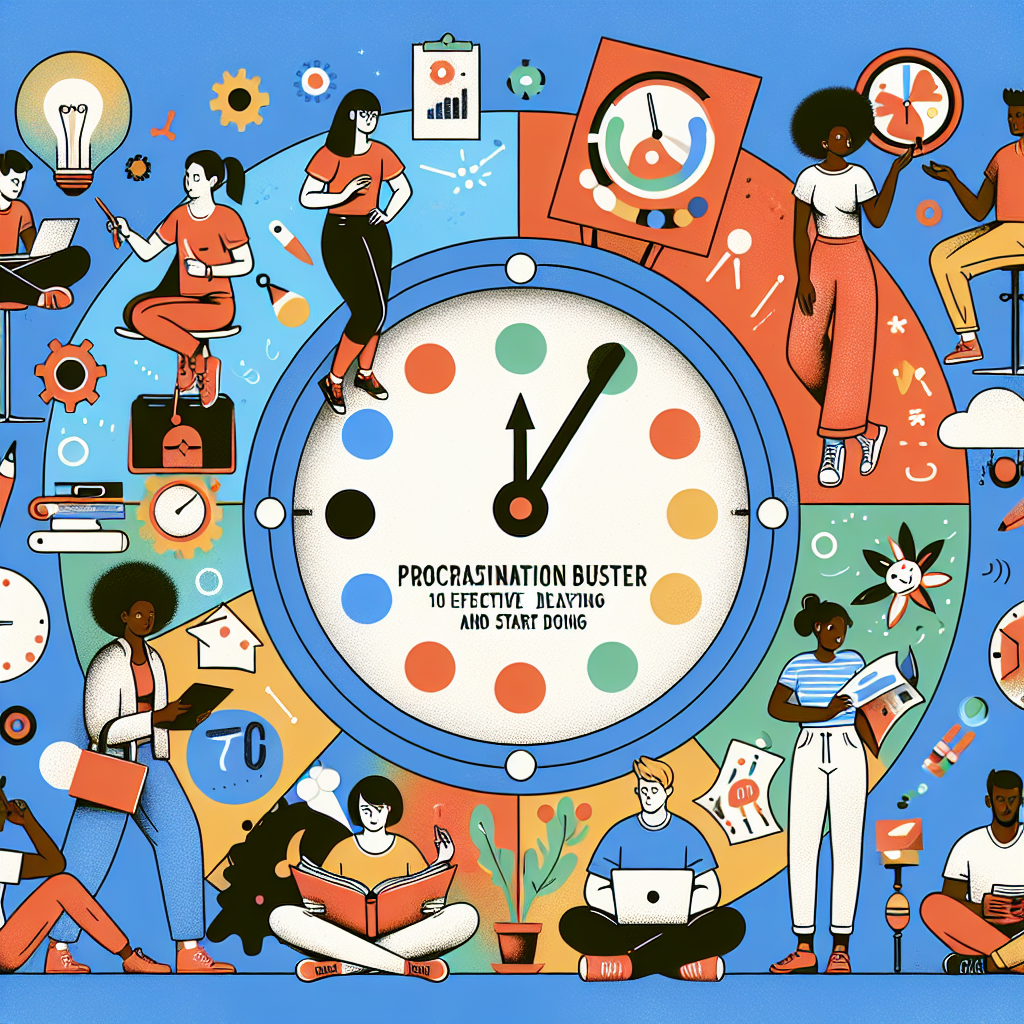Procrastination Buster: 10 Effective Strategies to Stop Delaying and Start Doing
Procrastination is something that many people struggle with on a daily basis. Whether it’s putting off a work assignment, cleaning the house, or going to the gym, we all have moments where we delay tasks that we know we should be doing. Procrastination can be a major obstacle to success and can lead to stress, anxiety, and a sense of failure. If you’re tired of constantly putting things off and want to break the cycle of procrastination, then you’ve come to the right place. In this article, we will explore 10 effective strategies to help you stop delaying and start doing.
1. Break tasks into smaller chunks
One of the main reasons people procrastinate is because they feel overwhelmed by the task at hand. Breaking tasks into smaller, more manageable chunks can help alleviate this feeling of overwhelm and make it easier to start working. Instead of thinking about the task as a whole, focus on one small section at a time. This will make the task feel more achievable and less daunting.
2. Set specific goals
Setting specific, measurable goals can help keep you motivated and focused. Instead of saying “I will clean the house today,” try setting a specific goal like “I will clean the kitchen and living room by 3 pm.” This way, you have a clear target to work towards and can track your progress along the way.
3. Use a timer
Setting a timer can help create a sense of urgency and can prevent you from getting distracted. One popular technique is the Pomodoro Technique, which involves working for 25 minutes and then taking a 5-minute break. This can help you stay focused and productive as you work through your tasks.
4. Eliminate distractions
Identify what distractions are causing you to procrastinate and take steps to eliminate them. This might mean turning off your phone, closing unnecessary tabs on your computer, or working in a quiet, distraction-free environment. By removing these distractions, you can increase your focus and productivity.
5. Reward yourself
Rewarding yourself for completing tasks can be a powerful motivator. Whether it’s a small treat, a break to watch a favorite TV show, or a night out with friends, find ways to celebrate your accomplishments. This can help create a positive reinforcement loop and make you more eager to tackle the next task.
6. Create a routine
Establishing a daily routine can help you stay organized and on track. By setting aside specific times each day for work, exercise, and relaxation, you can create a sense of structure and consistency in your life. This can help reduce procrastination and make it easier to stay focused on your goals.
7. Practice self-care
Taking care of yourself physically and mentally is crucial for overcoming procrastination. Make sure you’re getting enough sleep, eating well, and exercising regularly. Taking time to relax and recharge can improve your mood and energy levels, making it easier to tackle tasks with a clear mind.
8. Seek accountability
Having someone hold you accountable can help keep you motivated and on track. This could be a friend, family member, or colleague who checks in on your progress and offers support and encouragement. Knowing that someone else is aware of your goals can make you more likely to follow through on your commitments.
9. Visualize success
Visualizing yourself successfully completing a task can boost your motivation and confidence. Take a few minutes to imagine yourself finishing the project, feeling proud of your accomplishment, and enjoying the benefits of your hard work. This can help you stay focused on your goals and push through any resistance.
10. Practice mindfulness
Mindfulness techniques can help you stay present and focused on the task at hand. By practicing mindfulness meditation or breathing exercises, you can train your mind to stay calm and centered, even when faced with distractions or procrastination triggers. This can help you stay focused and productive as you work through your tasks.
FAQs:
1. I’ve tried many strategies to overcome procrastination, but nothing seems to work. What should I do?
If you’ve tried multiple strategies and still find yourself struggling with procrastination, it may be helpful to seek the guidance of a professional therapist or counselor. They can help you identify the root causes of your procrastination and develop personalized strategies to overcome it.
2. How long does it take to break the habit of procrastination?
Breaking the habit of procrastination can vary from person to person, depending on factors such as the underlying reasons for procrastinating and how motivated you are to change. With commitment and consistency, you can start to see improvements in your productivity and motivation over time.
3. Is procrastination a sign of laziness?
Procrastination is not necessarily a sign of laziness. It can be a complex behavior influenced by factors such as fear of failure, perfectionism, or overwhelm. By understanding the underlying reasons for your procrastination, you can take steps to overcome it and become more productive.
In conclusion, procrastination is a common challenge that many people face, but it doesn’t have to derail your goals and aspirations. By implementing these 10 effective strategies and seeking support when needed, you can break the cycle of procrastination and start taking action towards your dreams. Remember, small steps can lead to big changes, so don’t hesitate to start implementing these strategies today.





Leave A Comment